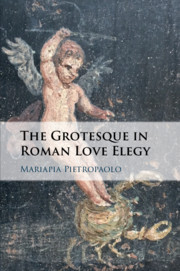Book contents
- The Grotesque in Roman Love Elegy
- The Grotesque in Roman Love Elegy
- Copyright page
- Dedication
- Contents
- Preface
- Acknowledgements
- Abbreviations
- Chapter 1 Premises and Expectations of the Elegiac Grotesque
- Chapter 2 Context and Prehistory of the Elegiac Grotesque
- Chapter 3 Cynthia and the Grotesque Ethos
- Chapter 4 The Ovidian Unmasking of the Elegiac Grotesque
- Chapter 5 Revolting and Refined: The Aesthetic Function of Acanthis
- Chapter 6 Grotesque Hermeneutics of the Lena in Tibullus and Ovid
- Chapter 7 The Rival: A Vir Foedus
- Chapter 8 Pasiphae and the Allurement of the Grotesque
- Chapter 9 Ovid’s Remedia and the Waning of the Elegiac Grotesque
- References
- Index
Chapter 9 - Ovid’s Remedia and the Waning of the Elegiac Grotesque
Published online by Cambridge University Press: 10 September 2020
- The Grotesque in Roman Love Elegy
- The Grotesque in Roman Love Elegy
- Copyright page
- Dedication
- Contents
- Preface
- Acknowledgements
- Abbreviations
- Chapter 1 Premises and Expectations of the Elegiac Grotesque
- Chapter 2 Context and Prehistory of the Elegiac Grotesque
- Chapter 3 Cynthia and the Grotesque Ethos
- Chapter 4 The Ovidian Unmasking of the Elegiac Grotesque
- Chapter 5 Revolting and Refined: The Aesthetic Function of Acanthis
- Chapter 6 Grotesque Hermeneutics of the Lena in Tibullus and Ovid
- Chapter 7 The Rival: A Vir Foedus
- Chapter 8 Pasiphae and the Allurement of the Grotesque
- Chapter 9 Ovid’s Remedia and the Waning of the Elegiac Grotesque
- References
- Index
Summary
In his diatribe against love in the De Rerum Natura, Lucretius unleashes a powerful grotesque imagination, endowing it with the gravitas of his philosophy, against the type of love that was to furnish the elegists with their basic theme. Writing the Remedia a generation later, Ovid assumes a perspective on elegiac love reminiscent of Lucretius, but whereas Lucretius was writing outside the boundaries of elegy, by chronology as well as choice of genre, Ovid is an elegist and writes from within its conventions. For Ovid, the aesthetic significance of the grotesque is that the elegiac code includes images that simulate foreignness of origin, in that they appear to intrude into the elegiac domain from somewhere beyond its boundary, while expressing ideas that are in fact generated entirely by the same code. Starting with this aesthetic premise and a narrative scenario in which unfulfilled desire figures as an apparently incurable malady, in the Remedia Ovid assumes a therapeutic stance with respect to both the afflicted lover and the elegist, teaching the one how to ‘unlearn’ his behaviour as a lover and the other how to attempt the ultimate permutation of the elegiac scenario, turning its narrative premise upon itself.
- Type
- Chapter
- Information
- The Grotesque in Roman Love Elegy , pp. 199 - 209Publisher: Cambridge University PressPrint publication year: 2020

